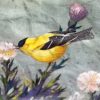
The goldfinch appears a week after the funeral. Margie is sitting on the porch with a rum and Coke when she sees the flash of yellow in the branches of the half-dead hemlock. Strange, she thinks. She’s never seen one here before.
“It’s just a bird,” says Lewis, when she tells him about it that night as they wash dishes. Two plates rather than three—don’t look, don’t look.
“But what if…”
“It’s not.”
They still sleep in the same bed, but Margie wonders if there will come a time when that ends. Lewis will say it’s her snoring, or she will say it’s the way Lewis tosses and turns all night, but it will be more than that. Deeper and worse than that.
The goldfinch is back the next afternoon, flitting alone in the evergreen branches. At one point Margie is sure the bird is staring right at her, and she lifts her glass in a salute.
Over supper, she tries again. “How can it be a coincidence?” she asks.
“Everything has meaning if you try and make it that way.”
“But what’s the harm in that?”
“It’s horse-shit.”
The next day, Lewis goes back to work for the first time since Brian died. Up before the sun, quite a feat this time of year, high summer with all the birds awake and singing by 5:00 AM. Margie lies in bed after he’s gone, trying to decide which songs belong to her bird.
By noon she’s on the porch watching the hemlock and waiting for any glimmer, any flash of yellow. But nothing. She goes back in the house. Stands outside Brian’s closed bedroom door with her palm pressed to the hollow-core wood, hoping to feel something there—a heartbeat, or the faintest echo of his footsteps inside the room. His sweet exhales. But nothing.
When Lewis gets home, Margie is asleep on the couch. She wakes to his warm hands on her bare feet. He smells like life before everything ended—sweat and sawdust and cigarettes.
“They put a cross beside the road.”
“What else?”
“Teddy bears. Plastic flowers. Goddamn pinwheels, Margie. Pinwheels.”
It was only a matter of time. All their friends and neighbors and distant cousins thinking that kind of memorializing is the thoughtful, Christian thing to do. They are mostly-kind, well-meaning people. Margie could murder all of them.
“Let’s go tear it up,” she says.
Lewis’s hands squeeze her toes. “Can we do that?”
“We’re the dead boy’s parents. We can do whatever the hell we want.”
They wait until dark. New moon, clouds hiding all the billion stars. It’s Margie’s first time on this stretch of road since it happened. Stepping down from Lewis’s pickup, she wonders if pieces of Brian are still on the pavement. She vomits into the ditch. Don’t look.
It’s a garish display, better suited for the trailer park across the bridge from the river than for the scene where a little boy had the life crushed out of him by a log truck. Those fuckers, Margie thinks as she rips the plywood cross from the grass and shoves it into a black trash bag. Fuckers, fuckers, fuckers.
“Look at this shit.” Lewis holds up a brand-new baseball, white as a fallen moon in his hands. “Who would think this is okay?”
“Same kinda people who say he’s playing baseball in heaven,” says Margie. Christ, how many of them said that at the funeral? He’s playing shortstop with the angels. He’s running bases with the angels.
Fuck those people. Fuck their angels.
Lewis chucks the ball toward the woods. Flying moon, gone inside the darkness.
Before they leave, they make sure every trace of the memorial is gone. Margie knows rumor will spread around town that some kids did this, desecrated what should be a holy site. She should feel bad for whoever gets the blame. She doesn’t. Lewis drives to the dump and they toss the trash bags into the pit, choking on the reek of sweet decay.
They sleep late the next morning, Lewis deciding not to go to work. “It was too soon,” he says. “I was useless yesterday.”
By noon they’re on the porch, passing a bottle of rum back and forth. All the usual sounds of summer—kids down the block, cars with open windows trailing bad pop music, moan of lawn mowers. Life goes on, the world keeps spinning. Everything they ever dreamed of is buried underground.
Amid the trees, the browns and greens, a tiny golden glimmer. Margie sees it, holds her breath.
“Look at that,” whispers Lewis.
The bird turns its yellow head their way. And suddenly starts singing.
 Shannon Bowring’s work has appeared in numerous journals, has been nominated for a Pushcart and a Best of the Net, and was selected for Best Small Fictions 2021. Her debut novel, The Road to Dalton, is forthcoming from Europa Editions. Shannon lives in Bath, Maine.
Shannon Bowring’s work has appeared in numerous journals, has been nominated for a Pushcart and a Best of the Net, and was selected for Best Small Fictions 2021. Her debut novel, The Road to Dalton, is forthcoming from Europa Editions. Shannon lives in Bath, Maine.
Video of Shannon Bowring reading Yellow Bird